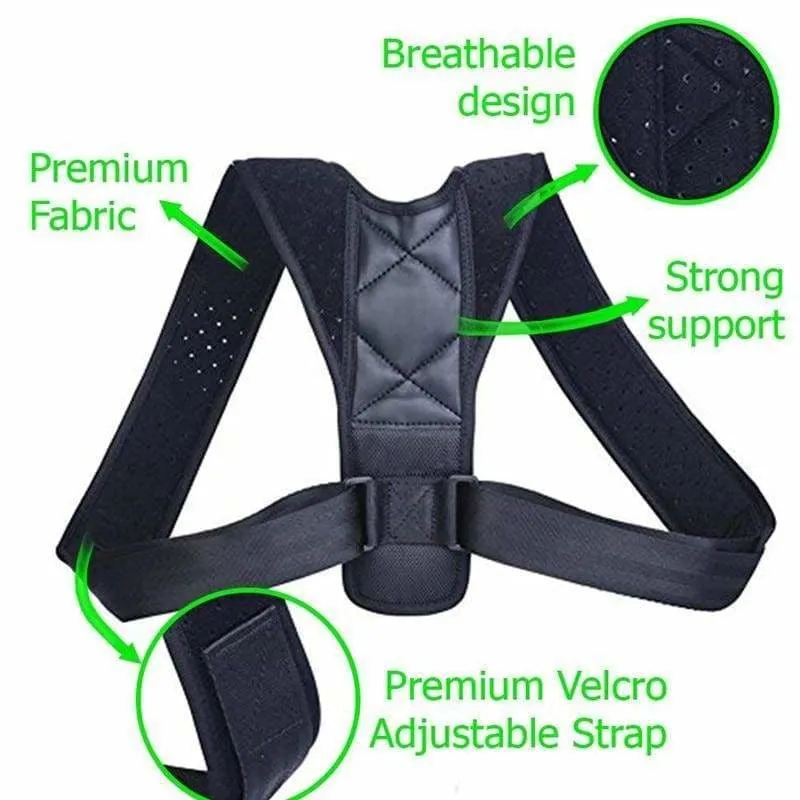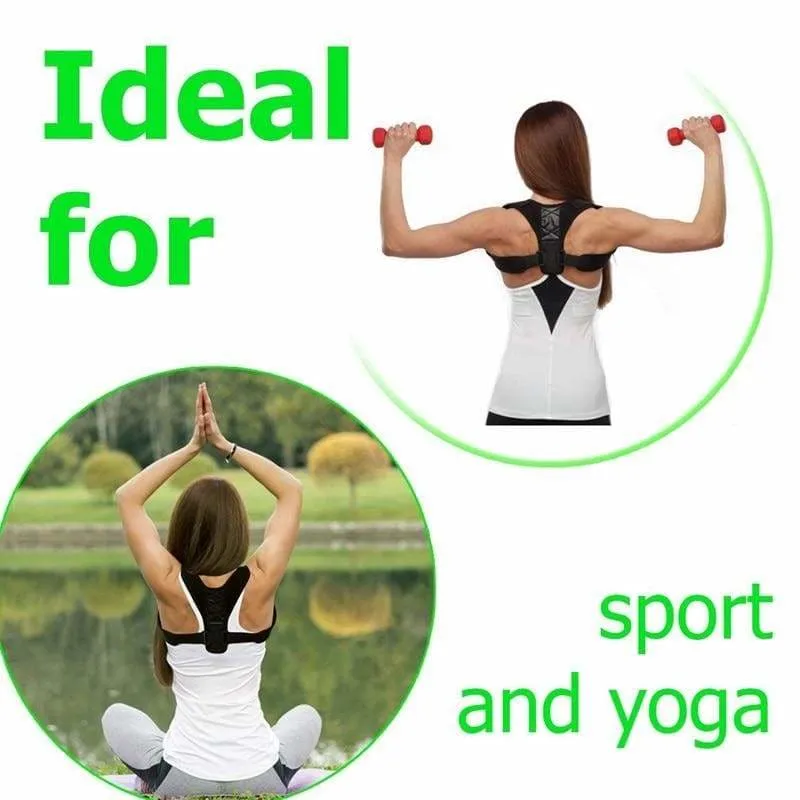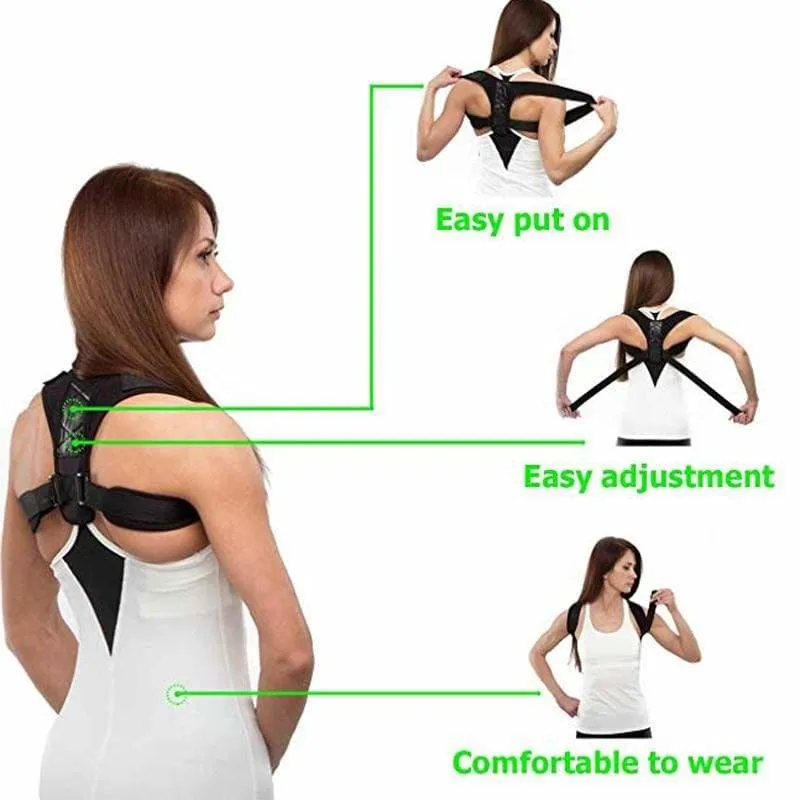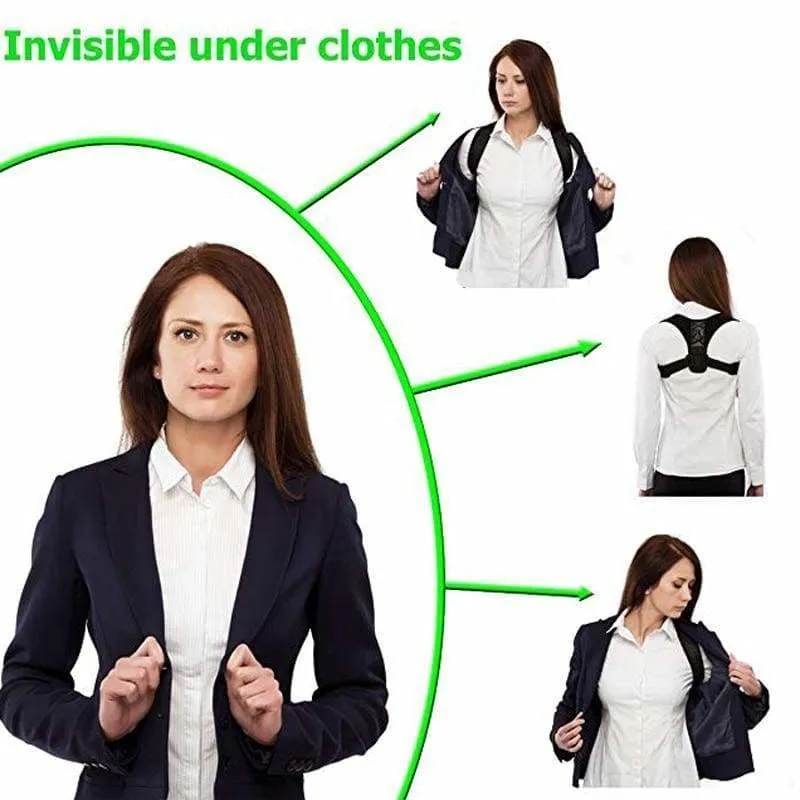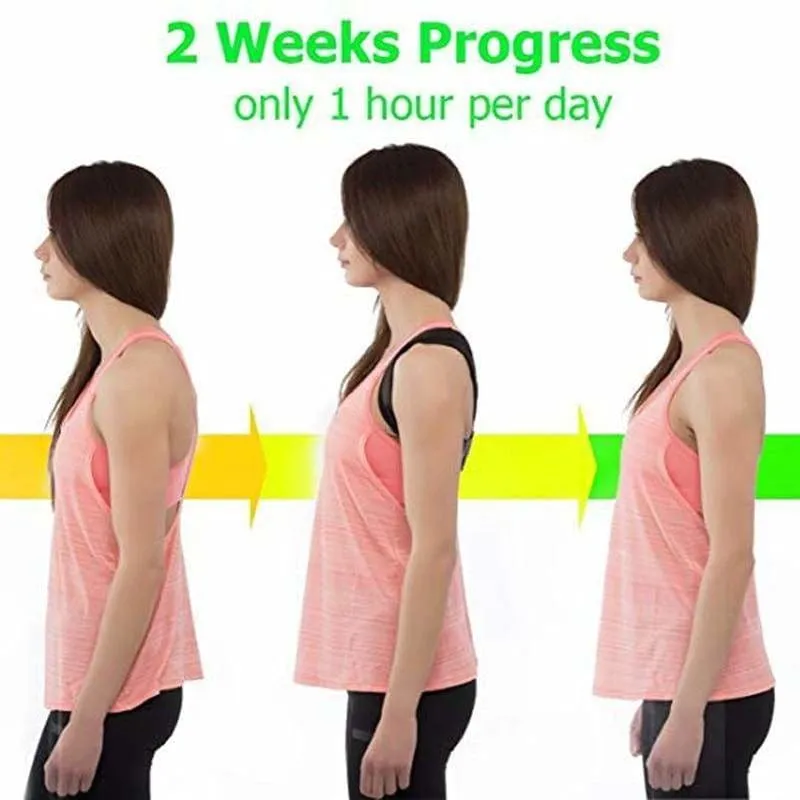🔥🔥 93% OF CUSTOMERS BUY 3 OR MORE 🔥🔥
Shoulder Posture Brace Corrector !!!
Bad posture can cause poor circulation, sore muscles, neck slouch, belly rolls and curvature of the back. The Magnetic Therapy Posture Corrector's unique ergonomic design gently realigns your shoulders and spine into the perfect position.
Back braces are hard to hide but the Magnetic Therapy Posture Corrector is virtually undetectable. Its padded adjustable straps are ultra comfortable and the support system helps energize your neck, shoulders and back. The stretchable Neoprene, nylon and cotton blend is so breathable it feels like a second skin and it's Machine Washable!
It's the perfect travel companion for car trips or long haul truckers.
Available in Black, White or Beige.
OUR GUARANTEE
At Best Buy Deal , we strive to offer top and high-quality products in the world.
If you have any questions about your order, please contact us by emailing us at [email protected]
Just click the "Add To Cart" Button Below! There's very limited stock, and they will go soon!
Note: Due to High Demand Promotional Items May Take Up To 2-4 weeks for delivery.
WE SUPPORT AN AMAZING CAUSE
We're thrilled to support Nanhi Pari Foundation is a Girl Child Right Organization which works for Education, Health & Nutrition for Girl Child.
Best Buy Deal'S 7-POINT HAPPINESS CHECKLIST
1. FREE Shipping Worldwide on special offers.
2. Fast, Sure & Safe delivery.
3. Safe Payment.
4. 30 Day Money Back Guarantee.
5. Real humans on our support help-desk!
6.Tracking number for every order.
7. We use encrypted SSL certificates for 100% security.
Poor Posture Facts
Mom was right: You should stand up straight.
Remember how your mom admonished you to sit or stand up straight? She was right. "Poor posture can have many negative effects on your health," says Dr. Kenton Fibel, a family medicine physician specializing in sports medicine at Cedars-Sinai Kerlan-Jobe Institute in Anaheim, California." Having poor posture can put more stress on certain muscles and joints, forcing them to be overworked and causing them to fatigue. Many patients with chronic pain can be helped by addressing their poor posture." Your posture reflects your outlook on the world, says Christopher Cousins, a physical therapist based in the District of Columbia. Here are 10 ways poor posture can affect your health:
Exacerbating arthritis
Poor posture can lead to malalignment of your spine or knees, which can increase stress on your knees. This can be particularly detrimental if you suffer from arthritis of the knees, says Dr. Chris Wolf, a sports medicine and regenerative orthopedic specialist at Bluetail Medical Group in Chesterfield, Missouri. "Over time, that malalignment can worsen the effects of arthritis by putting pressure on one part of the joint and causing pain. The pain can decrease your overall function and quality of life."
Poor circulation
If you sit in a chair for hours every day with poor posture, you're at risk of developing or worsening circulation issues, says Valentina Sendin, ergonomic project manager for Kaiser Permanente Southern California. "When you sit all day with poor posture, you're preventing your body from getting the necessary circulation it needs," she says. This can lead to varicose veins, which women are particularly at risk for. "Taking the time to move throughout the day and making postural changes can not only help you have better posture, it can prevent you from serious health issues later in life."
Fatigue
Poor posture can negatively affect your energy level, says Dr. Stacey Pierce-Talsma, an associate professor of osteopathic manipulative medicine at Touro University in Vallejo, California. "When we have poor posture, we add tension and compression to structures that weren't meant to bear that weight. These stresses and strains build up over time and wear down our bones, joints and ligaments, even changing the way our muscles fire," Pierce-Talsma says. "Not only can poor posture add stress and strain, it can also cause you to become fatigued more quickly. This occurs because poor posture and gait require much more energy and work to maintain and compensate for. The more efficient we can be in our good posture, movement and gait, the more we can improve our energy efficiency."
Mood
Research suggests poor posture can negatively affect your mood. For example, a study published in March 2017 in the Journal of Behavior Therapy and Experimental Psychiatry found that "adopting an upright posture may increase positive affect, reduce fatigue and decrease self-focus" in people with mild to moderate depression. In the study, 61 volunteers who had mild to moderate depression were asked to recite a speech, a task known to cause stress. Some of the participants sat with their usual posture, while others sat upright. The people who sat upright spoke more than the other group and used fewer first-person singular personal pronouns, the study found. A 2014 study published in Health Psychology produced similar results. In that research, 74 people were randomly assigned to either sit slumped or upright and were asked to complete a reading task and recite a speech. People who sat upright reported a higher self-esteem, a higher level of alertness, a better mood and less fear than those who slouched.
Forward head posture
Forward head posture is a common condition that occurs when your head is aligned forward in relation to your spine, says Mark Gugliotti, assistant professor of physical therapy at New York Institute of Technology School of Health Professions. "Ideally, a healthy head and neck relationship would align a person's ear with his or her shoulder when viewing them from the side," Gugliotti says. "As the head progressively lurches forward over time, the individual may succumb to a myriad of musculoskeletal dysfunctions impacting various systems of the body." This condition can tighten some muscles and weaken others, he says, leading to neck pain caused by muscle strain and tension headaches.
Jaw pain
Poor posture can lead to temporomandibular joint syndrome, which is also known as TMJ, says Anne Bierman, a physical therapist with Athletico Physical Therapy in the Chicago area. As poor posture misaligns the spine, it can also cause an improper bite pattern, which affects your temporomandibular joints – the two joints that connect your jawbone to the temporal bones of your skull. "These joints function similarly to a hinge, allowing you to open and close your mouth," Bierman says. "Poor posture in the neck and shoulders, or forward head posture, can cause these delicately balanced joints to become misaligned. When the jaw joints are misaligned, they’re more likely to pop, lock, cramp or even go into spasms, resulting in jaw pain and difficulty chewing."
Breathing efficacy
To breathe properly, your diaphragm needs to have enough space in the thoracic cavity to properly release and contract with each breath, Bierman says. Your ability to breathe optimally is boosted when your body is lengthened and in proper alignment. Poor posture and spine misalignment can compromise your ability to breathe well, she says. "Breath quality is important because the body needs to have oxygen in order to restore and rejuvenate the cells," Bierman says. Full, deep breaths help promote a healthy brain, heart and other vital organs, she says.
Headaches
Bad posture can contribute to tight neck muscles and compromise the natural curvature of your spine, which can lead to headaches, says Dr. Mariam Keramati, a physician with the physical medicine and rehabilitation department at Sinai Hospital of Baltimore. "Tight neck muscles can send pain radiating up to the head," Keramati says.
Shoulder and back pain
Poor posture can contribute to shoulder pain, according to the Mayo Clinic. It can lead to rotator cuff tendons pressing on the coracoacromial arch of your shoulder, which causes pain when you move or lie on the side of the affected shoulder. Bad posture can also lead to the shortening and contraction of the lumbar muscles, which can contribute to unhealthy tightness and lower back pain, says Sarah Luna, senior vice president of operations for Club Pilates, a boutique fitness franchise based in Costa Mesa, California. Back pain can also be caused by "military posture," in which someone tries to stand or sit up ramrod straight, lifting his or her chest and causing the lower back muscles to work too hard, says Isa Herrera, a physical therapist in New York City who’s written five books about women's health. "I call this the 'trying real hard to look straight' posture," she says. "Typically this person would suffer from aching and unrelenting pain and burning in the upper back muscles. It also contributes to lower back pain, since pushing out your chest will cause your lower back to overextend."
Sexual function
Having poor posture while sitting can adversely affect your sexual function, Herrera says. "Sacral sitting, or what I like to call rounded lower back sitting or slopping sitting, can be even worse than other postures," she says. "Sacral sitting can have profound effects on men's and women's sexual function because this posture shortens and tightens the pelvic floor muscles, which are our primary sexual muscles. When the pelvic floor muscles are tight and weak, they cannot exert their power and strength, and the end result can be weak or nonexistent orgasms." Weak pelvic floor muscles can affect the sexual function of men and women in different ways, she says. For example, men with a shortened and tightened pelvic floor caused by poor sitting posture may have less stamina and could experience weak ejaculations. Women with pelvic floor issues may experience reduced sexual arousal and infrequent orgasms, research has suggested.

 Cart(
Cart(
